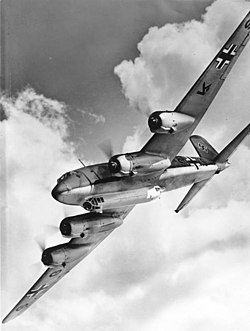Fliegerführer Atlantik
| Fliegerführer Atlantik | |
|---|---|

A Focke-Wulf Fw 200 Condor, the main threat to Atlantic convoys from the air
|
|
| Active | 1941–44 |
| Country |
|
| Branch |
|
| Type | Luftflotte |
| Role | Anti-shipping and naval interdiction operations |
| Size | Air Fleet |
| Engagements |
First Happy Time Operation Rheinübung Operation Berlin Last battle of the battleship Bismarck Second Happy Time |
| Commanders | |
| Notable commanders |
Martin Harlinghausen |
Fliegerführer Atlantik (German: "Flyer Command Atlantic") was a World War II Luftwaffe naval command dedicated to maritime patrol.
At the outbreak of World War II in September 1939, the Luftwaffe was an effective air force and contributed substantially to the success of the German army. Between the wars the German military had not developed naval aviation. There existed a shortage of naval aircraft with the necessary capabilities required to reconnoiter the seas in cooperation with Nazi Germany's Kriegsmarine or engage merchant vessels belonging to the Western Allies. By 1940, the Wehrmacht occupied much of Western Europe and Scandinavia. The Kriegsmarine and its commander-in-chief Erich Raeder saw this as an opportunity to destroy the sea communications of the United Kingdom, Germany's last significant opponent in Europe. Eventually, after much dispute, the German naval staff received an air support command named Fliegerführer Atlantik for the task of interdiction and reconnaissance.
In February 1941, the Oberkommando der Luftwaffe (OKL) was ordered by Adolf Hitler to form a naval air command to support the Kriegsmarine's U-boat operations in the Battle of the Atlantic. Though reluctant, the commander-in-chief of the Luftwaffe, Hermann Göring, agreed to the formation of the specialised naval command which would remain under the operational control of the Luftwaffe. It was subordinated to Luftflotte 3, commanded by Hugo Sperrle. The command had jurisdiction over all Luftwaffe operations in the Atlantic and supported German surface raiders and submarines attacking Western Allied shipping in the Atlantic Ocean, English Channel and Irish Sea. The organisation's first commanding officer was Martin Harlinghausen.
...
Wikipedia
